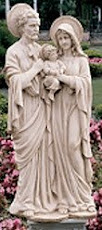+++++
Perhaps I'm dense (or, more flatteringly, an astute Catholic :) ), but I've never really understood why people of faith struggle with the whole "why am I here/what is the meaning of life?!" question.
It used to be (long before my CCD/Catholic school religion classes in the '80s) that even children were taught -- through the Baltimore Catechism -- the answer to that question:
“to know, love, and serve God in this life and to be happy with him in the next.”Though I don't recall ever hearing that as a girl, I do know that by the time I was in high school, I could articulate, in student-like terms, that we are on Earth to learn to love God, and that He takes us home to Heaven when we've mastered the skill adequately. My little ones, the eldest of whom is not yet four, are already learning an age-appropriate version of the answer in the Baltimore Catechism. Children are never too young to hear that message -- and neither are searching adults. After all, to do this takes a lifetime of work!
That brings us to the beautiful Office of Readings for December 21, this time an excerpt from St. Ambrose's commentary on the Blessed Mother's Magnificat in Luke's Gospel (also mentioned here):
A soul that believes both conceives and brings forth the Word of God and acknowledges his works.By the "Word of God," St. Ambrose is of course using a reference to Jesus from the beginning of St. John's Gospel. (Is it any wonder that St. Ambrose was so influential in the life of another great saint, Augustine?!)
...
Christ has only one mother in the flesh, but we all bring forth Christ in faith. Every soul receives the Word of God if only it keeps chaste, remaining pure and free from sin, its modesty undefiled. The soul that succeeds in this proclaims the greatness of the Lord, just as Mary's soul magnified the Lord and her spirit rejoiced in God her Savior. In another place we read: "Magnify the Lord with me." The Lord is magnified, not because the human voice can add anything to God, but because he is magnified within us. Christ is the image of God, and if the soul does what is right and holy, it magnifies that image of God, in whose likeness it was created and, in magnifying the image of God, the soul has a share in its greatness and is exalted.
The meaning of life, then, is to "conceive and bring forth" Jesus -- in a spiritual sense, to be another Mary! In order to do this, though, we must be as pure in the soul as Our Lady was in soul and body. To use her own words, we are to "magnify" the Lord; just as a dirty lens cannot properly convey to the eye what is being seen, if our souls are impure with sin, others cannot see Jesus properly through them!
We can also note the theme of godly joy which permeates this Advent season and these quotes ("be happy with [God]" and "rejoiced in God her Savior"). Though melancholics (such as I) struggle with this, we know that a sour person does not attract anyone and that, like everyone else, we must overcome the pitfalls of our natural temperament. The saints who were most effective in helping others find Our Lord were gentle, like St. Francis de Sales, and were cheerful, like Blessed Mother Teresa of Calcutta. Neither was known for earthly attractiveness (nor, for that matter, was Jesus, Whom the Bible tells us was not physically notable), yet both drew even the most hardened of sinners and cynics. Why? Because it was impossible to escape the image of God they had within and were magnifying!
Dear Jesus, we beg You to help us conceive and bear You to the world, to magnify You as Your Blessed Mother did, with purity and joy! Blessed Mother, pray for us. St. Ambrose and all you saints of God, pray for us!








